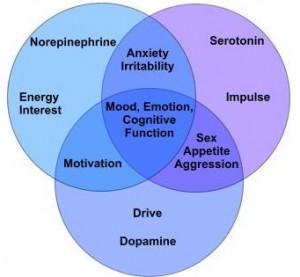Don Draper actor dealt with depression

Mad Men star Jon Hamm revealed to People magazine that he has struggled with depression. The 38 year old, who plays ad exec Don Draper on AMC’s hit show Mad Men, revealed that he suffered from chronic depression after the death of his father, who died when Hamm was 20. His mother had died of stomach cancer when Hamm was 10. He was treated with antidepressants and therapy and is doing well now. Hamm said that therapy “…gives you another perspective when you are so lost in your own spiral. It helps.” About medications, he added: “You can change your brain chemistry enough to think: ‘I want to get up in the morning; I don’t want to sleep until four in the afternoon. I want to get up and … go to work and …’ Reset the auto-meter, kick-start the engine!”
There is no single known cause of depression. Rather, it likely results from a combination of genetic, anatomic, neurochemical, environmental, and psychological factors.
Genetic: Some types of depression tend to run in families, suggesting a genetic link. However, depression can occur in people without family histories of depression as well. Genetics research indicates that risk for depression results from the influence of multiple genes acting together with environmental or other factors.
Anatomic: Brain-imaging technologies, such as magnetic resonance imaging (MRI), have shown that the brains of people who have depression look different than those of people without depression. For example, the hippocampus, a small part of the brain vital to the storage of memories and spatial navigation, appears to be smaller in people with a history of depression than in those who’ve never been depressed. The parts of the brain responsible for regulating mood, thinking, sleep, appetite and behavior also appear to function abnormally.
 Neurochemical: The brain is made up of billions of nerve cells or neurons. These neurons send and receive messages from the rest of your body and from within your brain using brain chemicals, called neurotransmitters. Important among these are the chemicals are serotonin, dopamine, norepinephrine, and epinephrine (also known as adrenaline), and Corticotropin-releasing factor (CRF). These brain chemicals—in varying amounts—are responsible for our emotional state. Depression happens when these chemical messages aren’t delivered correctly between brain cells, disrupting communication. This is important because a lot of the medications used to treat depression do so by changing the amounts of these neurotransmitters.
Neurochemical: The brain is made up of billions of nerve cells or neurons. These neurons send and receive messages from the rest of your body and from within your brain using brain chemicals, called neurotransmitters. Important among these are the chemicals are serotonin, dopamine, norepinephrine, and epinephrine (also known as adrenaline), and Corticotropin-releasing factor (CRF). These brain chemicals—in varying amounts—are responsible for our emotional state. Depression happens when these chemical messages aren’t delivered correctly between brain cells, disrupting communication. This is important because a lot of the medications used to treat depression do so by changing the amounts of these neurotransmitters.
Environmental and psychological: Trauma, loss of a loved one, a difficult relationship, or any stressful situation may trigger a depressive episode. Subsequent depressive episodes may occur with or without an obvious trigger.
Although most people have days when they feel unhappy or sad, depression is distinguished from this “situational depression” by the fact that these feeling do not go away in a few days, and that symptoms interfere with everyday life.
Symptoms include:
- Persistent sad or anxious feelings
- Feelings of hopelessness
- Feelings of guilt, worthlessness and/or helplessness
- Irritability, restlessness
- Loss of interest in activities or hobbies once considered pleasurable, including sex
- Fatigue and decreased energy
- Difficulty concentrating and memory problems
- Insomnia or excessive sleeping
- Overeating, or appetite loss
- Thoughts of suicide, suicide attempts
- Persistent aches or pains, headaches, cramps or digestive problems that do not ease even with treatment
Treatment for depression must be tailored to the individual; primary treatment is usually by a combination of antidepressant medication and “talk therapy”- either CBT – cognitive behavioral therapy or interpersonal therapy (IPT). CBT teaches people to change negative styles of thinking and behaving that may contribute to their depression. IPT helps people understand and work through troubled personal relationships that may cause their depression or make it worse.
For more information, click here to go to our Resounding Health Casebook on Depression.


























2 Comments